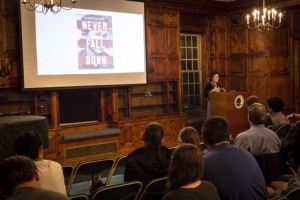 Patricia McCormick doesn’t pick the lightest fare to write about. Topics of her award-winning novels have included self-harm, teenage substance abuse, sexual slavery, and Cambodian genocide.
Patricia McCormick doesn’t pick the lightest fare to write about. Topics of her award-winning novels have included self-harm, teenage substance abuse, sexual slavery, and Cambodian genocide.
In an introduction to her fellow author on October 7, Madeleine Blais P’00, ’04 recounted how Ms. McCormick’s son once asked, “Where do you come up with your ideas for books, Mom? What do you do, Google the word sad?”
Yet, Ms. Blais said that of the people she knows, Ms. McCormick is one of the upbeat and optimistic—sharing a quality of all good writers: a deep and abiding belief that stories matter.
“She gave you a very good summary of the books,” agreed Ms. McCormick. “They are sad, but they all have a redemptive quality.”
The goal of her novels, Ms. McCormick explained during her Writers’ Workshop lecture, the second in this year’s series, is to “shine a light on a dark topic.”
 For her book Never Fall Down, Ms. McCormick worked closely with Arn Chorn-Pond, who survived the Cambodian genocide and Khmer Rouge labor camps when he was a teenager. After showing a short film with interviews from Mr. Chorn-Pond, Ms. McCormick talked about how she took that deeply personal story and turned it into a novel.
For her book Never Fall Down, Ms. McCormick worked closely with Arn Chorn-Pond, who survived the Cambodian genocide and Khmer Rouge labor camps when he was a teenager. After showing a short film with interviews from Mr. Chorn-Pond, Ms. McCormick talked about how she took that deeply personal story and turned it into a novel.
“The trick to writing fiction, especially fiction outside of my culture, is to put on blinders and only know what that character could know,” she said.
Although Ms. McCormick initially tried to write in an authoritative, authorly voice, she quickly realized that such a narration was “dead on arrival.” Instead, and with his permission, Ms. McCormick used the rhythms and accidental poetry that were particular to Mr. Chorn-Pond’s spoken English.
“I needed to get out of the way,” she said. “This is not my story, this is his.”
Ms. McCormick said that, for her teenage readers, writing books in a particularly relatable way raised questions about how they, too, would act under particularly difficult or challenging circumstances.
 “These books give you a chance to take some of those questions about a your identity out for a test drive,” Ms. McCormick told the Williston Northampton students. “They are all about people your age. Normal people under extraordinary pressures, doing extraordinary things.”
“These books give you a chance to take some of those questions about a your identity out for a test drive,” Ms. McCormick told the Williston Northampton students. “They are all about people your age. Normal people under extraordinary pressures, doing extraordinary things.”
Ms. McCormick said that the process of creating a novel based on a personal story could also be incredibly cathartic. After visiting Indian brothels and interviewing women there for her story, Sold, on sexual slavery, Ms. McCormick said she was finally able to start talking publicly about how she, too, was a survivor of sexual abuse.
“I used to have a lot of shame in saying that,” she said. “Now I don’t.”
Ms. McCormick said one of her next projects is to work closely with Malala Yousafzai on a book for teenage readers about how the Pakistani schoolgirl pursued a desire for education—and was targeted by the Taliban as a result. But perhaps it should come as no surprise that after spending so many years telling the stories of others, Ms. McCormick said she also started working on her own memoir.
“It’s time for me to tell my own story,” she said.

